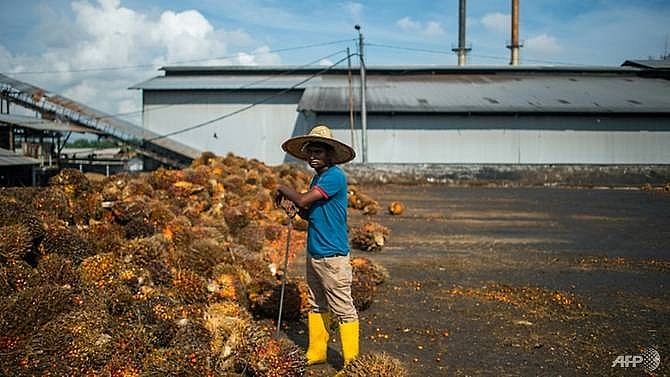Malaysia to press EU on planned palm oil ban in biofuels
 |
| Malaysia and Indonesia are the world's top exporters of palm oil. (Photo: AFP/Mohd Rasfan) |
The European Parliament earlier this year voted in favour of a draft law on renewable energy that calls for the use of palm oil in biofuels to be banned from 2021, amid mounting worries about its impact on the environment.
Malaysia and Indonesia will be hard hit as they are the world's top exporters of palm oil.
Malaysian Trade Minister Mustapa Mohamed said he will raise the issue when he meets with EU Trade Commissioner Cecilia Malmstroem on the sidelines of an Association of Southeast Asian Nations (ASEAN) trade ministers' meeting in Singapore.
The two-day meeting began on Thursday and includes talks with Malmstroem, who is heading an EU delegation. ASEAN is a regional bloc of 10 Southeast Asian nations.
"This is a subject that is very important to us. Of course, I will raise the subject with her when I see her later," Mustapa told reporters.
"We've been in communication and they've been providing assurances that this is not final yet," he said, adding that the European Parliament vote is not yet binding.
He said the livelihoods of more than 650,000 smallholders living in rural Malaysia would be affected by any ban.
"You cannot discriminate against the poor people of Malaysia and Indonesia," he said.
Palm oil, also a major ingredient in products from food to cosmetics, has long been controversial as environmentalists say it drives deforestation, with huge swathes of rainforest logged in recent decades to make way for plantations.
The use of the commodity in food and cosmetics had already dropped in Europe, partly due to pressure from green groups on major corporations, but has been increasing in biofuels.
What the stars mean:
★ Poor ★ ★ Promising ★★★ Good ★★★★ Very good ★★★★★ Exceptional
Related Contents
Latest News
More News
- Russian President congratulates Vietnamese Party leader during phone talks (January 25, 2026 | 09:58)
- Worldwide congratulations underscore confidence in Vietnam’s 14th Party Congress (January 23, 2026 | 09:02)
- Political parties, organisations, int’l friends send congratulations to 14th National Party Congress (January 22, 2026 | 09:33)
- 14th National Party Congress: Japanese media highlight Vietnam’s growth targets (January 21, 2026 | 09:46)
- 14th National Party Congress: Driving force for Vietnam to continue renewal, innovation, breakthroughs (January 21, 2026 | 09:42)
- Vietnam remains spiritual support for progressive forces: Colombian party leader (January 21, 2026 | 08:00)
- Int'l media provides large coverage of 14th National Party Congress's first working day (January 20, 2026 | 09:09)
- Vietnamese firms win top honours at ASEAN Digital Awards (January 16, 2026 | 16:45)
- ASEAN Digital Ministers' Meeting opens in Hanoi (January 15, 2026 | 15:33)
- ASEAN economies move up the global chip value chain (December 09, 2025 | 13:32)

 Tag:
Tag:




















 Mobile Version
Mobile Version